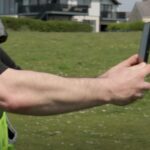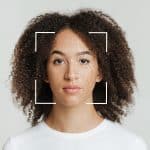Half a million shoplifters can’t be right

By Professor Fraser Sampson, former UK Biometrics & Surveillance Camera Commissioner
When Napoleon said that we were a nation of shopkeepers, he may not have meant it as the economic complement it is today. In the 21st century UK retail is an industrial stalwart. Contributing around 5% of the nation’s gross domestic product and employing 2.7m people across almost 325,000 businesses, the sector covers corner shops and online vendors, fuel forecourts, supermarkets, airports and shopping malls. Some people like to see big numbers on the side of a large vehicle before being persuaded. If that’s you, how about £8.9 billion? According to a research briefing published in the House of Commons library, that’s what retail sales contributed to the UK economy in March. Every week.
British economist Adam Smith boosted the UK’s free market lineage and we still enjoy a reputation of thriving, innovative retailers. But both contribution and reputation are under threat and the latest figures show how crime is piling modern injury on historical insult.
The office for our nation’s statistics (ONS) recently published the evidence that theft from shops in England and Wales last year passed the half million mark for the first time. The British Retail Consortium has testified that thefts from UK retailers in 2024 rose by 3.7 million to 20.4 million and cost them £2bn. Violence and abuse against shopworkers rose by 50% and now average over 2,000 incidents every day. Food suppliers are part of our Critical National Infrastructure (CNI) – you might ask which other part endures that level of attack. I can’t think of one.
The shoplifting verdict from Prime Minister, Sir Keir Starmer, is that it has wreaked havoc on our neighbourhoods for years and the Crime and Policing Bill will restore the ‘seriousness’ of the offence of retail theft. But police funding has just been docked and criminals get bolder with every shared TikTok clip of their activities.
In policing, when demand outstrips ability to respond, people improvise. By using their own technology to recover their stolen cars and phones people are giving new literal meaning to the phrase ‘left to our own devices’.
We shouldn’t be surprised that retailers are turning to technology to tackle what is often daylight robbery. But that is also under siege by co-ordinated campaigns to deny them access to effective biometrics like facial recognition.
When weighing up the privacy issues in retail crime it’s worth remembering that most of our nation’s shops are private premises. We enter by implied invitation. If the shopkeeper knew we planned to steal from them, attack staff or other invitees, they would withdraw that invitation – and the law in England and Wales would let them. Until now, the challenge has been knowing who to let in and whose presence deserves further scrutiny. Under the highly successful ‘pub watch’ scheme known troublemakers are stopped from entering licensed premises in UK neighbourhoods, sparing police resources and avoiding harm in pubs and clubs. That scheme originally relied on faxed photographs and human memory. As I noted in a previous Biometric Update column, crime prevention technology has moved on considerably. AI-enabled security systems like live facial recognition (LFR) can now be perpetrator-focused, allowing identification to be carried out with far greater speed and accuracy, no longer relying on word of mouth descriptions and swapped photos, but using the best available digital evidence, auditably and accountably, with clear records, policies and data sharing protocols.
Solutions such as LFR empower retailers to take back control of their space and identify the small minority of people whose previous visits to their stores have resulted in loss, assault, intimidation and predatory behaviour. The use of LFR to protect food stores has been expressly endorsed by New Zealand where the Privacy Commissioner noted the need for retailers to approach the technology with caution and care. If they are to use this technology lawfully and responsibly, UK supermarkets and other retailers must factor in some big considerations before they even think about adopting remote biometric systems. Facial recognition isn’t a plug-and-play solution and choosing a competent technology partner is essential. But our nation’s shopkeepers have been able to refuse admittance to their premises since Boney’s days, and the law supporting them has been around for more than seven centuries.
A recent chair of the Home Affairs Select Committee avowed that the UK government ‘will not tolerate the criminality blighting our communities’. Signalling zero tolerance (putting up notices) has been fashionable in retail for a while but the numbers suggest the intolerance has been extremely elastic. Properly designed and managed security systems mean retailers can now back up their words with their technology and prevent the behaviour that is undeniably blighting their sector. While not all are using biometric options, most retailers have exhausted the other methods and their incidents still feature in the alarming statistics, while those deploying compliant technology report reductions of up to 70%.
We may never have been a nation of shopkeepers numerically speaking but our economy still depends heavily on the retail sector and we’ve just witnessed how quickly our high street shelves empty when a major supplier like M&S is disrupted. If the retail sector isn’t to be protected like the rest of the CNI, shouldn’t it at least be allowed to protect itself?
If we don’t do something meaningful to stop burgeoning retail crime, we may soon be taunted for being a nation of shoplifters. For shopkeepers the numbers are worrying, for the nation they should be too. Whatever your view on their privacy rights, half a million shoplifters must be wrong.
About the author
Fraser Sampson, former UK Biometrics & Surveillance Camera Commissioner, is Professor of Governance and National Security at CENTRIC (Centre for Excellence in Terrorism, Resilience, Intelligence & Organised Crime Research) and a non-executive director at Facewatch.
Article Topics
biometrics | criminal ID | facial recognition | Fraser Sampson | retail biometrics







Comments